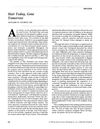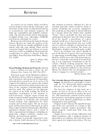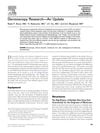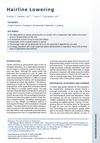 12 citations,
January 1984 in “Anesthesia & Analgesia”
12 citations,
January 1984 in “Anesthesia & Analgesia” Anesthesia and surgery can cause temporary hair loss, but hair usually grows back without treatment.
 11 citations,
October 2015 in “Journal of Cosmetic Dermatology”
11 citations,
October 2015 in “Journal of Cosmetic Dermatology” Half of hair restoration surgeons experience body discomfort, especially after follicular unit extraction procedures, and using ergonomic equipment or robotic devices could reduce this discomfort.
 6 citations,
July 2006 in “International Journal of Dermatology”
6 citations,
July 2006 in “International Journal of Dermatology” Football players can get many skin conditions from their sport, which need different treatments and can be prevented with good hygiene and protection.
 4 citations,
August 2007 in “Journal of The American Academy of Dermatology”
4 citations,
August 2007 in “Journal of The American Academy of Dermatology” The document discusses a condition causing hair loss after surgery and a type of rosacea affecting the nose, with treatments including surgery and laser therapy.
 4 citations,
July 1993 in “The Journal of Dermatologic Surgery and Oncology”
4 citations,
July 1993 in “The Journal of Dermatologic Surgery and Oncology” The article concludes that hair restoration techniques must account for ongoing hair loss to ensure successful long-term results.
 2 citations,
December 2019 in “Cureus”
2 citations,
December 2019 in “Cureus” A patient with a scalp condition and benign skin tumor experienced hair loss and did not improve with treatment, choosing not to have surgery despite a small cancer risk.
 1 citations,
May 2023 in “Curēus”
1 citations,
May 2023 in “Curēus” A man had a benign pilar cyst on his face, which is rare and was successfully removed by surgery.
 1 citations,
December 2021 in “Kathmandu University medical journal”
1 citations,
December 2021 in “Kathmandu University medical journal” Adult earlobe can have a benign cyst that is usually removed by surgery.
 1 citations,
January 2019 in “Springer eBooks”
1 citations,
January 2019 in “Springer eBooks” Hidradenitis Suppurativa is a chronic skin condition best treated early with surgery for better outcomes and less recurrence.
 1 citations,
May 2018 in “Hair transplant forum international”
1 citations,
May 2018 in “Hair transplant forum international” Hair transplant techniques and scalp micropigmentation can effectively hide scars and hair loss after cranial surgery.
 1 citations,
July 1999 in “Plastic and Reconstructive Surgery”
1 citations,
July 1999 in “Plastic and Reconstructive Surgery” The article discusses how to fix bad results from hair restoration surgery, with different doctors suggesting methods like adding more grafts, moving transplanted hair, or using smaller grafts.
 June 2023 in “British Journal of Dermatology”
June 2023 in “British Journal of Dermatology” Coinheritance of BRCA2 and CYLD genes may lead to new treatment options for certain cancers.
 November 2019 in “Harper's Textbook of Pediatric Dermatology”
November 2019 in “Harper's Textbook of Pediatric Dermatology” Understanding normal hair growth and loss in children is key to diagnosing and treating hair disorders.
 March 2018 in “Surgical and Radiologic Anatomy”
March 2018 in “Surgical and Radiologic Anatomy” High-resolution imaging is crucial for diagnosing and planning treatments in clinical anatomy and aging.
 September 2007 in “Dermatologic Surgery”
September 2007 in “Dermatologic Surgery” 3% hydrogen peroxide does not reduce hair graft survival compared to saline.
 September 2002 in “Dermatologic Surgery”
September 2002 in “Dermatologic Surgery” The best results in surgical hair restoration come from careful techniques, optimal use of limited hair supply, correct hair direction, saving hair for key areas, understanding scarring effects, and adjusting hair graft density.
 February 2004 in “Plastic and Reconstructive Surgery”
February 2004 in “Plastic and Reconstructive Surgery” The book gives a basic overview of cosmetic surgery topics but lacks depth and innovation, especially in hair restoration.
 238 citations,
July 2003 in “British Journal of Plastic Surgery”
238 citations,
July 2003 in “British Journal of Plastic Surgery” Hidradenitis suppurativa, a chronic skin disease, can be managed with antibiotics, lifestyle changes, and in severe cases, surgery. Early diagnosis and careful planning are key, and laser treatment can be an efficient solution for mild to severe cases.
 203 citations,
December 2004 in “Journal of The American Academy of Dermatology”
203 citations,
December 2004 in “Journal of The American Academy of Dermatology” Early diagnosis and treatment, using finasteride, minoxidil, or hair transplantation, improves hair loss outcomes.
 126 citations,
January 1987 in “Journal of The American Academy of Dermatology”
126 citations,
January 1987 in “Journal of The American Academy of Dermatology” The document concludes that understanding hair structure is key to diagnosing hair abnormalities and recommends gentle hair care for management.
 69 citations,
December 2015 in “Journal of Controlled Release”
69 citations,
December 2015 in “Journal of Controlled Release” Nanocapsules can improve clobetasol delivery to hair follicles, reducing side effects.
 39 citations,
October 1967 in “British Journal of Dermatology”
39 citations,
October 1967 in “British Journal of Dermatology” Hair loss in women often doesn't follow a pattern, isn't linked to age, may be genetic, and can be related to thyroid issues or other health factors.
 30 citations,
September 2009 in “Seminars in Cutaneous Medicine and Surgery”
30 citations,
September 2009 in “Seminars in Cutaneous Medicine and Surgery” Dermoscopy has greatly improved the diagnosis of skin lesions and our understanding of their morphology and biology.
 30 citations,
May 2004 in “Journal der Deutschen Dermatologischen Gesellschaft”
30 citations,
May 2004 in “Journal der Deutschen Dermatologischen Gesellschaft” The document concludes that early diagnosis and treatment are crucial for children with hair loss to prevent permanent damage, although not all conditions can be effectively treated.
 26 citations,
October 2012 in “Dermatologic Clinics”
26 citations,
October 2012 in “Dermatologic Clinics” The document details hair transplantation techniques and innovations, highlighting Follicular Unit Transplantation as the standard and discussing the effectiveness and challenges of the procedure.
 25 citations,
January 2009 in “Oral and Maxillofacial Surgery Clinics of North America”
25 citations,
January 2009 in “Oral and Maxillofacial Surgery Clinics of North America” Successful hair transplant surgery depends on careful patient selection, proper surgical plan and technique, and attentive aftercare.
 23 citations,
April 2018 in “Journal der Deutschen Dermatologischen Gesellschaft”
23 citations,
April 2018 in “Journal der Deutschen Dermatologischen Gesellschaft” Permanent hair loss from cicatricial alopecia is treated by reducing inflammation and managing symptoms, but regrowth in scarred areas is unlikely.
 22 citations,
August 2013 in “Facial Plastic Surgery Clinics of North America”
22 citations,
August 2013 in “Facial Plastic Surgery Clinics of North America” A cosmetic procedure can lower the hairline by up to 10 cm, with high satisfaction but potential for temporary sensation loss and rare risks.
 22 citations,
August 2010 in “Annals of Plastic Surgery”
22 citations,
August 2010 in “Annals of Plastic Surgery” The study concluded that reconstructive surgery for burn alopecia should be tailored to the scar's size and quality, with different methods recommended for different cases.
 20 citations,
July 2008 in “Dermatologic Therapy”
20 citations,
July 2008 in “Dermatologic Therapy” The document says that treating the root cause of hair follicle damage is crucial to prevent permanent hair loss, and treatment options vary.






























